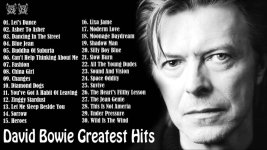I'm a pretty big admirer of Bowie, so naturally I'm going to disagree.
Depending on how you tally the numbers, he released 25 studio albums (that is excepting live albums, anthologies, etc.) before his death. Bowie was constantly experimenting and challenging himself, so yes, many of his albums do sometimes sound disjointed and uneven (especially his late 80's and 90's releases). But others are grandiose experiments that are aurally and thematically cohesive, taking the listener through a kaleidoscope of wonderful art rock and baroque pop. The obvious examples are Hunky Dory, his fourth album where he truly cemented both his sound and his core artistic approach; and Rise of Ziggy Stardust, a blistering weird and joyous concept album that would lay the thematic foundations of his alien persona(s) during the early and mid 70's. These albums have obvious hits and deep cuts, and both are sequenced well and the latter tells a narrative, however bizarre.
But it's not just those heavy hitters. Blackstar is a jazz-infused album exploring one's mortality. Low is an album cleaved in two parts, the first part a baroque pop affair that uses the metaphors of intimate relationships to talk about (and around) getting over drug addiction, and the second half an atmospheric and purely instrumental collection of compositions that are moody and just plain wonderful. The Next Day and Scary Monsters, though both very different in sound and composition, both share a similar thematic backbone in that lyrically much words are spent looking back on a career with a sense of irony and bemusement, and both albums are straightforward and complete affairs, laden with deep cuts (The Next Day in particular is loaded with them, with Valentine's Day being a particular favorite of mine).
There are some people who treat Bowie as a greatest hits artist, and those people are usually married to his 70's output. It's understandable. His output in the mid-to-late 80's was lousy, and his 90's works, though admirable in the experimental qualities, were uneven. Many fans, especially stateside, had checked out by then. Which is too bad, because his last four albums, Heathen, Reality, The Next Day, and Blackstar are all excellent, with Heathen being a particularly underrated gem.
But even in at his worst, Bowie was always an album oriented artist; for the exception of his some of his more commercial albums such as Let's Dance--albums he made in part to thumb his eye at RCA records for practices he viewed as stifling his creativity--he always worked to make complete albums. Many of the songs he would push as singles were the kind of songs that most publishers were keen not to push, thinking they didn't have radio potential (Ashes to Ashes is the obvious example). Don't write off Bowie as a GH artist. You're missing out if you do.













